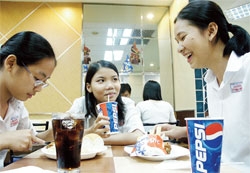PepsiCo works up factory thirst
 The world’s second-largest food and beverage producer has told Dong Nai Industrial Zones Management Authority (DIZA) it wants to for acquire the entire water and fruit juice factory of Philippines-based San Miguel in the Amata Industrial Zone. San Miguel wants to offload the facility.
The world’s second-largest food and beverage producer has told Dong Nai Industrial Zones Management Authority (DIZA) it wants to for acquire the entire water and fruit juice factory of Philippines-based San Miguel in the Amata Industrial Zone. San Miguel wants to offload the facility.
The PepsiCo proposal sent to DIZA would see the US company investing $45 million into San Miguel’s factory to produce 15 million cartons of fresh water, tea, carbonated and non-carbonated brands each year.
Vo Thanh Lap, head of DIZA, said the zone had sent the PepsiCo proposal to the relevant ministries and provincial authorities.
However, he did not say when San Miguel would be able to complete the administrative procedures for dissolution, implying PepsiCo would have to wait for that to happen before expanding its investment at the industrial zone.
San Miguel Vietnam started in 2003 with total registered investment capital of nearly $40 million. It produced bottled water and fruit juice using locally sourced raw materials. The investment was part of the company’s five-year plan to capture a wider market in the Asia-Pacific region and to cash in on Vietnam’s long-term prospects.
However, things did not go according to plan. San Miguel operated for just nine years of a 40-year lease and had to carry out liquidation procedures for its plant because of ineffective business in the recent years, according to a source from DIZA.
This newly proposed PepsiCo plant is part of the $250 million Vietnam investment programme PepsiCo unveiled in August, 2010. PepsiCo entered Vietnam in 1991. Its Pepsi, 7-Up, Mirinda and Sting branks are popular in this market.
A year ago, PepsiCo kicked-off construction of a $73 million beverage manufacturing factory in Vietnam-Singapore Industrial Park in northern Bac Ninh province. The firm is now running a packed food factory in southern Binh Duong province, while preparing for the construction of another packed food factory in central Quang Nam province.
General Statistics Office figures show Vietnam’s consumption of non-alcoholic beverages rose 3.7 per cent year-on-year in 2011. Consumption of carbonated products grew 12.2 per cent, signalling positive growth for the beverage market amid economic slowdown.
The Ministry of Industry and Trade estimates the domestic production capacity of non-alcohol beverage will reach 4 billion litres in 2015.
What the stars mean:
★ Poor ★ ★ Promising ★★★ Good ★★★★ Very good ★★★★★ Exceptional
 Tag:
Tag:
Related Contents
Latest News
More News
- State corporations poised to drive 2026 growth (February 03, 2026 | 13:58)
- Why high-tech talent will define Vietnam’s growth (February 02, 2026 | 10:47)
- FMCG resilience amid varying storms (February 02, 2026 | 10:00)
- Customs reforms strengthen business confidence, support trade growth (February 01, 2026 | 08:20)
- Vietnam and US to launch sixth trade negotiation round (January 30, 2026 | 15:19)
- Digital publishing emerges as key growth driver in Vietnam (January 30, 2026 | 10:59)
- EVN signs key contract for Tri An hydropower expansion (January 30, 2026 | 10:57)
- Vietnam to lead trade growth in ASEAN (January 29, 2026 | 15:08)
- Carlsberg Vietnam delivers Lunar New Year support in central region (January 28, 2026 | 17:19)
- TikTok penalised $35,000 in Vietnam for consumer protection violations (January 28, 2026 | 17:15)






















 Mobile Version
Mobile Version